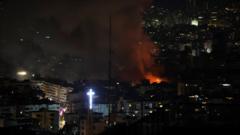In a heart-wrenching recount of the situation in Gaza, parents endure extreme challenges to feed their malnourished children while aid remains critically limited.
Parents in Gaza Face Dire Hunger Crisis: ‘All We Want Is a Loaf of Bread’

Parents in Gaza Face Dire Hunger Crisis: ‘All We Want Is a Loaf of Bread’
As aid restrictions intensify, families in Gaza struggle to nourish their children, revealing a deepening humanitarian emergency.
As families in Gaza brace themselves against an unprecedented humanitarian crisis, parents like Nour Barda and Heba al-Arqan find themselves in desperate circumstances to provide enough nourishment for their children. Despite initial hopes stemming from a temporary truce in November 2023, the escalating violence and stringent Israeli restrictions have confined them to a harsh reality.
In April 2024, the couple welcomed their daughter, Shadia, into a world where food scarcity is exacerbated by a nearly three-month blockade that saw Israel tightly control the flow of aid into the territory. Today, with the blockade beginning to ease, extremely limited supplies have trickled in, leaving parents to struggle with dire hunger while trying to care for their newborns.
The plight of the Barda family underscores a broader crisis in Gaza, where the humanitarian system has faltered under the weight of conflict and chaos. Traditional United Nations-supported aid programs have collapsed in the face of violence, with looting and fighting rendering safe passage for necessary supplies virtually impossible. New distribution systems, laden with controversy, have emerged but these efforts have reportedly fallen significantly short of meeting the needs of the 2 million residents living in Gaza.
Recent reports indicate that while new groups claim to have delivered nearly nine million meals to those in need, the United Nations asserts that this assistance is insufficient to cover the overwhelming demand. On the ground, security measures have involved private contractors and military presence, illustrating the complex dynamics impacting aid distribution.
The tragic reality persists: Parents like Barda and al-Arqan only wish for one simple thing amidst a crisis—“All we want is a loaf of bread.”
In April 2024, the couple welcomed their daughter, Shadia, into a world where food scarcity is exacerbated by a nearly three-month blockade that saw Israel tightly control the flow of aid into the territory. Today, with the blockade beginning to ease, extremely limited supplies have trickled in, leaving parents to struggle with dire hunger while trying to care for their newborns.
The plight of the Barda family underscores a broader crisis in Gaza, where the humanitarian system has faltered under the weight of conflict and chaos. Traditional United Nations-supported aid programs have collapsed in the face of violence, with looting and fighting rendering safe passage for necessary supplies virtually impossible. New distribution systems, laden with controversy, have emerged but these efforts have reportedly fallen significantly short of meeting the needs of the 2 million residents living in Gaza.
Recent reports indicate that while new groups claim to have delivered nearly nine million meals to those in need, the United Nations asserts that this assistance is insufficient to cover the overwhelming demand. On the ground, security measures have involved private contractors and military presence, illustrating the complex dynamics impacting aid distribution.
The tragic reality persists: Parents like Barda and al-Arqan only wish for one simple thing amidst a crisis—“All we want is a loaf of bread.”





















